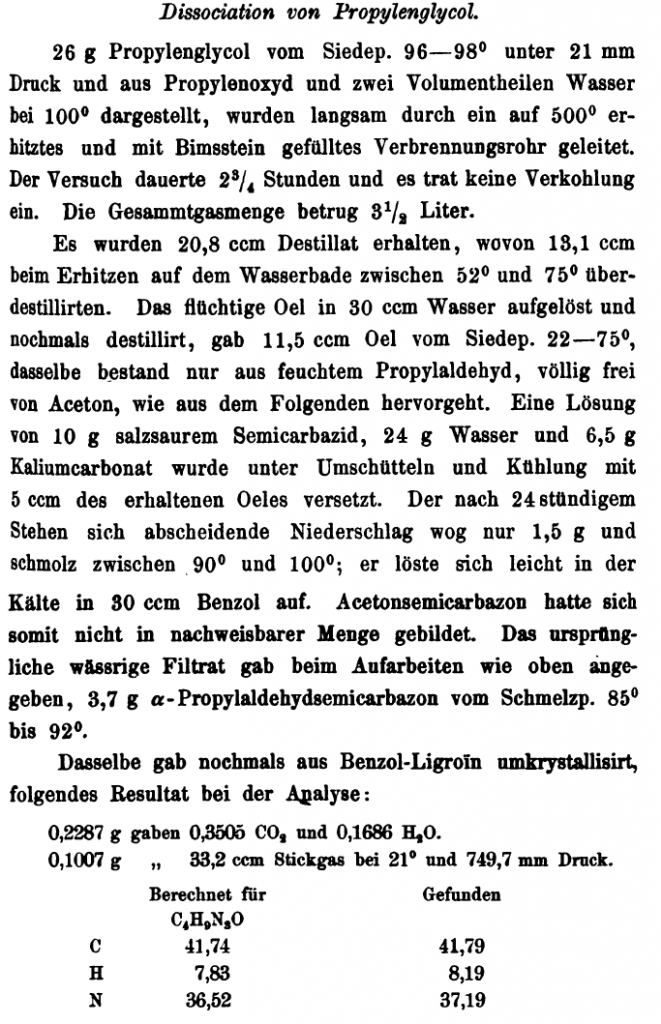Yugen
Harmless

Posts: 23
Registered: 20-12-2014
Member Is Offline
Mood: No Mood
|
|
Aldehydes from 1,2-Diols
While reading the discussion section of an OrgSyn prep for Propionaldehyde I came across a cool aldehyde prep which I had never heard of before, the thermal dehydration of 1,2-diols (aka Vicinal diols). How awesome is that? If one wanted propanal for instance, as the article suggests, you could just heat Propylene glycol in a makeshift oven to get your product. That would be so easy and cheap! Propylene glycol and ethylene glycol are in stores
everywhere and therefore would be great sources of OTC propanal and acetaldehyde (the prior chemicals are used for E-cigarettes and anti-freeze
respectively).
So I tracked down the original German source and it was luckily free on Google books. Here it is. I then painstakingly typed the text into Google translate... and garbage came out the other end.
From the Google link above (page 203), this is what I got:
| Quote: |
Dissociation of Propylene Glycol
26 g of propylene glycol (0.34 mol) from bp. 96-98° mm shown at 100° under 21 mm pressure and the propylene oxide and two volumes of water were
slowly passed through a heated at 500° and filled with pumice combustion tube. The experiment took 2 hours and 45 minutes. There was a no charring.
The total amount of gas was 3 liters. 20.8 cc of distillate were obtained, of which 13.1 cc of distilled over when heated on a water bath between 52°
and 75°. The volatile oil in 30 cc of distilled water and dissolved again, was 11.5 cc of oil bp. 22-75° the same consisted only of Propanal wet,
completely free of acetone, as can be seen from the following. [There was more but I gave up here] |
So I got a couple facts (maybe):
Reduce the pressure from 760 mm Hg to 21 mm Hg for the reaction
Pass propylene glycol vapors through a tube furnace filled with pumice at 500ºC
Reaction was completed in 165 minutes (so vapors were passed through the tube at ≈ 0.16 grams per minute)
9.3 grams of propanal (a 41.7% yield) were obtained (assuming it was pure and therefore had a density of 0.81 g/ml)
So I now have a little bit more information than when I started, but not really enough to feel comfortable about trying anything in the lab.
Anyone read German better than Google Translate? Or better yet does anyone have an English source for this reaction that I can understand all by
myself?
1,2-Diol dehydration sounds pretty awesome for an aldehyde synthesis, but of course there might be easier and cheaper ways. Feel free to comment if
you think you have a cooler way to propanal, I am all ears.
[Edited on 20-12-2014 by Yugen]
[Edited on 20-12-2014 by Yugen]
[Edited on 20-12-2014 by Yugen]
|
|
|
Yugen
Harmless

Posts: 23
Registered: 20-12-2014
Member Is Offline
Mood: No Mood
|
|
So here is the snippet from the article for your viewing convenience.

|
|
|
Chemosynthesis
International Hazard
    
Posts: 1071
Registered: 26-9-2013
Member Is Offline
Mood: No Mood
|
|
I don't believe I was familiar with that either. I think it sounds cool, and am definitely interested in the concept.
|
|
|
Dr.Bob
International Hazard
    
Posts: 2659
Registered: 26-1-2011
Location: USA - NC
Member Is Offline
Mood: No Mood
|
|
I can see propylene oxide getting converted to the propanal by heating, but I have not seen that method for diols.
|
|
|
Yugen
Harmless

Posts: 23
Registered: 20-12-2014
Member Is Offline
Mood: No Mood
|
|
Quote: Originally posted by Dr.Bob  | | I can see propylene oxide getting converted into propanal by heating, but I have not seen that method for diols. |
Agreed, although it does mention propylene oxide in the second sentence (along with water). I wonder if it is implying an in-situ synthesis
of propylene oxide? Perhaps that compound is an intermediate in their proposed reaction mechanism? Can't tell from the terrible translation though...

|
|
|
S.C. Wack
bibliomaster
    
Posts: 2419
Registered: 7-5-2004
Location: Cornworld, Central USA
Member Is Offline
Mood: Enhanced
|
|
https://books.google.com/books?id=jbVMAAAAYAAJ&pg=PA132
I'd go with the OS prep.
High-temp vapor-phase dehydrations are not unknown. There is a related patent, US2501042.
|
|
|
Yugen
Harmless

Posts: 23
Registered: 20-12-2014
Member Is Offline
Mood: No Mood
|
|
Yeah, I'm thinking the same thing unfortunately.  Perhaps someone with an 500ºC
oven and some free time will benefit from this... As for myself, I am done dreaming in this direction. Thanks for the help though. Perhaps someone with an 500ºC
oven and some free time will benefit from this... As for myself, I am done dreaming in this direction. Thanks for the help though.
|
|
|